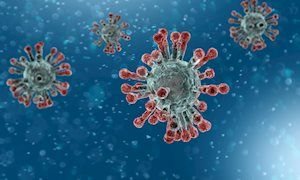
The biggest risk factor for getting uterine cancer is being overweight or severely overweight (obesity). Research by Hannah Donkers, PhD candidate at the Radboudumc, shows that obesity also causes a worse survival rate in women with uterine cancer. In addition, it appears that lower socioeconomic class and anemia also contribute.
BMI does not provide complete information
Every year in the Netherlands, approximately 2000 women are told that they have uterine cancer. This makes it the most common gynecological cancer in the Western world. To determine whether a woman is overweight, the Body Mass Index (BMI) is usually used. However, BMI does not look at fat distribution or muscle mass. Hannah Donkers' research shows that women with a lot of visceral fat (fat around your organs) and obesity combined with little muscle mass have a higher chance of dying from uterine cancer. She therefore argues for a broader view on obesity: "By not only looking at BMI, but also at the fat distribution and muscle mass, we can better guide patients and offer a specialized training program with dietary advice. As a result, we can hopefully improve the survival rates of these women."
Following America
Because of smears and HPV vaccination, cervical cancer is very well known, while uterine cancer is more common. In addition, many people do not know that obesity is the biggest risk factor for getting uterine cancer and also causes a decreased survival. That obesity causes high blood pressure, diabetes and cardiovascular disease is often known, but the relationship with uterine cancer is not yet. "Although there are not as many people in the Netherlands who are (morbidly) obese as in America, it is going in the same direction. The obesity pandemic may well cause more healthcare costs and problems than the COVID-19 pandemic" says Donkers. What's her advice? "If you have abnormal vaginal bleeding, get tested. Especially if you are overweight. If you catch it early, uterine cancer is more treatable."
Hopeful future
Donkers' research also reveals a hopeful prospect: a new diagnostic method. A urine test may be able to speed up and facilitate the diagnosis of uterine cancer in the future. By looking in urine for the presence of microRNA, tiny particles of a person's genetic material, uterine cancer may be able to be detected. These specific RNA particles play an important role in the development of obesity and are seen in many different diseases, including cancer. Such a test can remove a lot of stress for this target group. Donkers: "How nice would it be if women no longer had to endure the tedious examinations and biopsies and only had to pee in a cup for a reliable diagnosis? More research is needed, but the first stones have been laid."
About the PhD defense
Thesis: Endometrial cancer; obesity-related carcinogenesis and diagnostic innovations.
Promotor is Professor R.L.M. Bekkers and Copromotor Dr J.M.A. Pijnenborg. The research took place at the Royal Cornwall Hospital, Truro, Cornwall, England under the supervision of miss Khadra Galaal and was financially supported by the Ruby and Rose Foundation Hannah Donkers will receive her PhD on April 22 at 12:30 at the Radboudumc/ Radboud University. Her PhD can be followed live here.
-
Want to know more about these subjects? Click on the buttons below for more news.
Related news items

More than five million euros for research to improve palliative care Jeroen Hasselaar will lead research project with Horizon grant
15 June 2022 Jeroen Hasselaar will lead a large international research project. With a 5.3 million euro grant from the EU's Horizon program, he and his team want to improve palliative care for cancer patients, together with partners from nine European countries. go to page
Rosella Hermens appointed professor of Person-centered oncological integrated care
7 April 2022 Rosella Hermens has been appointed Professor of Person-centered oncological integrated care at Radboud university medical center/Radboud University. She investigates how care for patients with cancer can become more person-centered and better organized, while the patient remains in control. go to page



